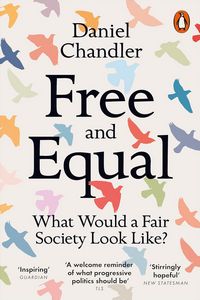Book reviews – Hester/Srnicek, Merchant, Chandler
 After Work. A History of the Home and the Fight for Free Time. By Helen Hester & Nick Srnicek. Verso, 2023. 282pp.
After Work. A History of the Home and the Fight for Free Time. By Helen Hester & Nick Srnicek. Verso, 2023. 282pp.
A key concept in this book is ‘social reproduction’. What the authors mean by this is work in areas such as healthcare, education, catering and social services, as well as the essential, ‘unpaid’ work people do outside of the workplace and largely at home (cooking, caring, cleaning, etc.). They examine the contribution of this kind of work to keeping human society operating across the whole range of other work taking place in the production and distribution of goods and services. Their approach to this is to trace the evolving history of that social reproduction, in particular as it has operated in the domestic sphere over the last century and a half, the influence on it of advancing technology (eg electricity, gas, sewerage, running water, waste removal), and the changes in attitudes and expectations this has brought about. Referring to themselves as ‘socialist republicans’, they devote the final chapter of their book to examining what the future might hold for social reproduction and the home generally, especially in an imagined new social context referred to variously as ‘post-work’, ‘post-capitalism’ or ‘post-scarcity’.
This is a detailed many-faceted exposition which draws upon multiple sources and studies. They point to how capitalism forces many workers ‘to waste precious hours of their lives on work that is neither stimulating, creative nor productive’, how much of the ‘free time’ spent at home is taken up with unsatisfying chores, especially for women, and how wasteful (‘a colossal squandering of human time, effort and labour’) is the organisation of people into atomised individual housing units which makes each person or family continually repeat activities such as cooking, laundering, washing up and cleaning rather than save energy, time and trouble by making communal activities of them. In their analysis of how the organisation of work and home in capitalist society presents obstacles to activity that satisfies individuals’ needs and talents, they also point tellingly to how, in ways we will all recognise, technology, ‘rather than reducing the amount of time spent on work …more often than not … seems to lead to more work’, while, if the social conditions were different, that same technology could ‘serve as an ally in the quest for temporal autonomy and for the recognition, redistribution and reduction of reproductive labour’.
It is in their final chapter, entitled ‘After Work’, that they put the most detailed flesh on what they consider could, given the right social conditions, constitute truly fulfilling non-coercive progress for human society. After offering a thoroughly recognisable picture of work under capitalism (eg, ‘the majority of us must give up forty hours or more per week in exchange for survival, typically selecting from a narrow range of possible jobs where decisions over what we do on a daily basis ultimately lie outside of our hands’), they talk about how ‘real freedom requires the absence of domination’, which currently workers are subject to both from their bosses and from impersonal market forces, while what is needed is for work to become ‘the focus of more freely chosen commitments’. What do they envisage? While not claiming to offer a ‘sketch’ rather than a blueprint, they look, for example, to ‘a free time infrastructure’ where ‘people have opportunities to develop their capacities and pursue collective projects’ with ‘infinite possibilities for human interaction’. They look to provision of ‘non-nuclear living arrangements’ with ‘more experimental models of early years care’. They look to communities being ‘turned from passive recipients of technologies into networks of active creators’. And, commendably, all this is envisaged as being within a framework of ‘from each according to their abilities, to each according to their needs’.
There is, however, is a key criticism to be made of the way this ‘imaginary’ (a word frequently used by the authors) is presented, in that it all seems to be seen as doable within the framework of the current society of money and wages, buying and selling and government control – in other words within the market system which the book has previously and quite rightly condemned as drastically limiting personal and social freedoms. So, for example: it expresses support for ‘government policies’ aiming ‘to provide support for public and community-based systems of care; ’it talks of ‘a free time infrastructure’ that provides ‘free museums’ and ‘free school meals and breakfast clubs’ for children’ – implying of course the continuation of overall social transactions via money; and, even more explicitly, it advocates ‘decent wages and better conditions for domestic workers’. In other words everything it commends is envisaged as happening via government action within the money system and without – or at least prior to — the establishment of the society of voluntary work, democratic control and free access to all goods and services that is the very essence of socialism. This seems to indicate a failure on the part of the authors, despite their obviously positive intentions and explicit aspiration for the ‘construction of a better world’, to accept that, so long as we have a system of governments overseeing the money and wages system, that system itself will not allow well intentioned reforms to come to fruition willy-nilly and any reforms that do get enacted can just as easily be reversed if those ‘impersonal market forces’ they refer to dictate it.
So, while there is much to reflect on here in terms of the kind of life that might be possible if workers were set free from ‘the realm of necessity’ that capitalism imposes, a good deal of that will only be feasible once workers in a majority take the necessary political action – ideally via the ballot box – to do away with governments and with money, wages and profit and cooperatively organise society. The Socialist Party is sometimes – unfairly — called ‘utopian’ for advocating this, but the true utopianism lies in trying to somehow see as possible true freedom in work and association within the framework of a social and economic system that by definition cannot allow it.
HKM
 Endgame. Economic Nationalism and Global Decline. By Jamie Merchant. Reaktion Books. 2004.
Endgame. Economic Nationalism and Global Decline. By Jamie Merchant. Reaktion Books. 2004.
Is globalisation coming to an end and capitalism returning to a period like that between the two world wars of the last century when economic nationalism and beggar-thy-neighbour policies were the norm? Merchant makes out a case for this, starting from basically Marxian premises.
He describes how, from the point of view of actual production, the world is one system involving workers everywhere:
‘Pick a typical product of contemporary globalization — say a laptop computer. The laptop is sold for money by the company that owns it only as the end result of a transnational sequence of extraction, processing, manufacturing, assembly, transportation, and distribution, involving thousands of laborers doing different kinds of work for a range of contractors across dozens of countries’ (pp. 125-6).
In the course of such ‘planetary assemblages’ the world working class, as a class, produce a pool of surplus value from which firms and states compete to draw a share as profits. The profits of capitalist firms do not depend on how much surplus value its workers might be said to produce; in fact some firms, as those in the inflated financial sector, don’t produce any but are very successful in capturing some. The profits a firm makes depends on how well it is organised to draw profits from the world pool of surplus. In this, firms are helped by states.
‘National competition,’ Merchant writes, ‘is competition over the global surplus product. Monetary policies, tax laws, corporate subsidies and trade agreements are some of the measures states take to assist their national corporations in raising profitability, that is, in capturing more of this global surplus’ (p. 98).
He defines ‘globalisation’ as the period when global production, and so the pool of global surplus value, was expanding. The governments of the leading capitalist states favoured the liberalisation of world trade by abolishing or lowering tariff barriers as they believed that this would lead to world trade expanding even more.
Merchant’s basic thesis is that this period is coming to an end because the continuing mechanisation imposed by competition has led to a fall in the rate of profit, resulting in ‘the global pool of surplus value available for redistribution as profits shrink[ing] relative to total capital invested worldwide’ (pp. 153-4).
Competition to capture profits has become more intense — more of a zero-sum game — and states are being compelled to intervene more actively to try to steer profits to enterprises within their boundaries. ‘Global productivity growth’, he writes, ‘appears to be over for the foreseeable future. The result is likely to be a kind of stasis state in which national governments must take ever more extreme measures to compensate for the paralysis of private capitalism’ (p.134). Hence the rise of economic nationalism and of parties advocating ‘national sovereignty’.
Slow productivity growth and slower expansion of world production are plausible explanations for the observable move away from globalisation, as so-called ‘neo-liberalism’ on a world scale, and towards economic nationalism (from governments subsidising selected enterprises as supposed engines of growth to the rise of nationalist and nativist political parties). Whether this is the endgame for capitalism is another matter.
In the final chapter Merchant seems to envisage capitalism being overthrown and the wages system abolished by spontaneous mass rioting. That’s another matter too.
ALB
 Free and Equal: What Would a Fair Society Look Like? By Daniel Chandler. Penguin £10.99.
Free and Equal: What Would a Fair Society Look Like? By Daniel Chandler. Penguin £10.99.
In 1971 the political philosopher John Rawls published A Theory of Justice. This has had a massive impact in the academic world, giving rise to a great many articles and books discussing its argument, but it has so far had few consequences in practical politics, and that is what Daniel Chandler sets out to alter here. He presents arguments for a ‘fair society’, which Rawls referred to as ‘realistically utopian’. This review will focus on Chandler’s proposals, sometimes looking at the theoretical background to these.
Essentially, a programme of reforms is set out, including universal basic income and a higher minimum wage. There would be increased taxes on capital income, more progressive inheritance tax and an annual wealth tax on the largest fortunes. Employees should have more say in how their workplaces are run, and co-management (which is found in Germany) would mean workers and owners sharing control rights within a company. Worker co-operatives might be an improvement on this, though. Fee-paying schools would be abolished, and more would be spent on children from less-advantaged backgrounds. University education would be financed by combining free tuition and income-contingent loans. Politics could be made more democratic if corporate donations to political parties were banned and there was a cap on individual donations. Each citizen could be given a ‘democracy voucher’, so they could make an annual donation to a party or candidate of their choice. A combination of electoral and direct democracy would make political equality more likely. Communities could be in charge of local budgets, perhaps by means of citizens’ assemblies.
Rawls’ work is based on a thought experiment. In Chandler’s words, ‘we should ask ourselves what kind of world we would choose to live in if we didn’t know who we would be within it’. Presumably people would opt for a world with little inequality or discrimination, with nobody’s life experience dependent on their gender, ethnicity or sexuality, with equality of opportunity as far as possible. But the trouble is that both authors’ views are stuck within capitalism. Chandler writes: ‘We should rely on markets to distribute most consumer goods and services because the alternative would be some form of state-controlled rationing.’ But this is not the only alternative: a society of free access and production for use based on the common ownership of the means of living could provide a decent life for everyone.
The few remarks made here about socialism are not at all enlightening. Chandler says it is not clear what sort of society socialists today stand for. In a note he states that socialists now advocate reforms, rather than the use of public ownership and central planning, as supposedly used to be the case. But acquaintance with the case of the Socialist Party would show that we oppose reformism and have a definite proposal for future society, and this does not involve central planning. A better response to Rawls’ thought experiment would be a world without money or classes or states or borders, and this is entirely realistic.
PB
2 Replies to “Book reviews – Hester/Srnicek, Merchant, Chandler”
Leave a Reply
You must be logged in to post a comment.

Most of those authors see capitalism as being broken and in need of being fixed. The problem is that capitalism isn’t broken, it’s functioning as intended.
“Rawls’ work is based on a thought experiment. In Chandler’s words, ‘we should ask ourselves what kind of world we would choose to live in if we didn’t know who we would be within it’. Presumably people would opt for a world with little inequality or discrimination, with nobody’s life experience dependent on their gender, ethnicity or sexuality, with equality of opportunity as far as possible.”
Which class you were born into has a much greater effect on your life experience than your ethnicity, etc.
If I could wave a magic wand and make, for example, wealth evenly distributed between men & women, I would (because that would be progressive). However, it wouldn’t be fair because (under capitalism) 1% of the population would still own most of the wealth, with 50% of the population owning very little wealth.